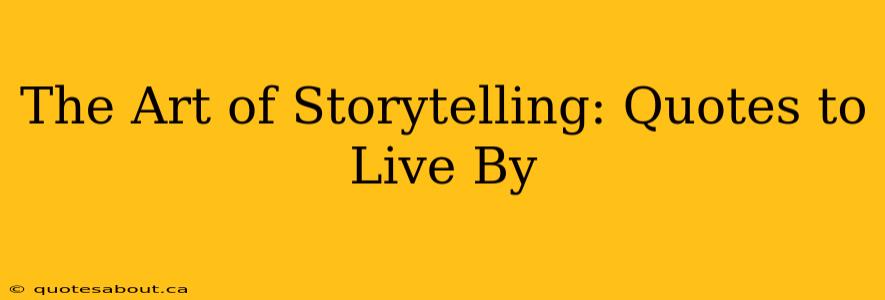The Art of Storytelling: Quotes to Live By
Storytelling. It's the oldest form of human communication, a powerful tool that transcends cultures and generations. From campfire tales to epic novels, stories connect us, teach us, and inspire us. But what makes a story truly resonate? What are the secrets whispered by the masters of narrative? This exploration delves into the art of storytelling, offering insightful quotes that illuminate its power and enduring relevance. We'll examine the craft from multiple perspectives, offering practical wisdom for both seasoned storytellers and those just beginning their journey.
What makes a good story?
A compelling story isn't just about plot twists and exciting events; it's about connecting with the human experience. It's about crafting characters that readers can empathize with, worlds they can believe in, and themes that linger long after the final page is turned. Many great writers and thinkers have articulated this sentiment in profound ways. Consider these words from the masters:
-
"The true alchemists do not change lead into gold; they change the world into words." – William H. Gass: This quote beautifully captures the transformative power of storytelling. A skilled storyteller takes the raw material of life—experiences, emotions, observations—and transmutes them into something meaningful and enduring.
-
"Stories are a powerful way to shape our understanding of the world. They can change our beliefs, influence our actions, and even help us make sense of our own lives." – Unknown: This statement highlights the significant impact stories have on shaping our perspectives and guiding our behavior. They are not mere entertainment; they are tools for understanding and growth.
How do I improve my storytelling?
Mastering the art of storytelling is a lifelong journey, requiring dedication, practice, and a willingness to learn. It involves understanding narrative structure, character development, and the subtle nuances of language. Here are some insights that address this common question:
-
"Begin with the end in mind." – Stephen Covey (adapted): While not strictly a storytelling quote, this principle is incredibly relevant. Knowing the resolution or core message of your story helps guide your narrative choices and ensure a cohesive and impactful final product.
-
"Show, don't tell." – Anton Chekhov: This classic piece of writing advice emphasizes the importance of using vivid imagery and sensory details to create a rich and immersive experience for the reader. Instead of stating a character's emotions, reveal them through their actions, thoughts, and dialogue.
-
"There's no such thing as a bad story, only bad storytellers." – Unknown: This encouraging statement reminds us that even the most unpromising premise can be transformed into a captivating narrative through skillful execution. It's about the approach, not the initial idea.
What are some common storytelling mistakes to avoid?
Even seasoned storytellers can fall into traps. Recognizing common pitfalls can prevent significant setbacks and improve the storytelling process. Here's how to avoid some common mistakes:
-
"The most important thing is to be honest with yourself. If you're not honest with yourself, you can't be honest with your reader." – Richard Adams: Authenticity is paramount. A story that rings true on an emotional level connects more deeply than one built on artificiality or insincerity. Self-reflection is key to crafting believable characters and plots.
-
"Never underestimate the power of a good ending." – Unknown: A powerful conclusion elevates the entire story. It provides closure, reinforces themes, and leaves a lasting impression. Don't rush the ending; craft it carefully to provide a satisfying resolution.
How can I make my stories more engaging?
Storytelling is ultimately about engaging the reader on an emotional level. These points tackle what makes stories stick:
-
"A good story is like a good joke. It starts with a premise, and then it plays with it until it creates something unexpected and funny or tragic." – Unknown: This emphasizes the need for a solid foundation but also the importance of surprise and unexpected turns to maintain reader interest.
-
"The best stories are those that make you feel something." – Unknown: This highlights the power of emotion in storytelling. Stories that tap into universal human experiences, like love, loss, fear, and joy, create a deeper connection with the audience.
In conclusion, the art of storytelling is a multifaceted craft demanding creativity, dedication, and a deep understanding of the human condition. By incorporating these quotes and insights into your storytelling practice, you can craft compelling narratives that resonate with readers for years to come. Remember, the most powerful stories are those that connect, inspire, and leave a lasting impact on the hearts and minds of those who experience them.

